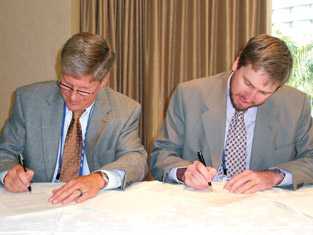
Palestine Reports Adoption of ASTM Copper Standards
Papua New Guinea Standards Body Signs MOU with ASTM
James Thomas, president, ASTM International, and Chey Scovell, deputy chairman, Papua New Guinea National Institute of Standards and Industrial Technology, sign a memorandum of understanding in September.
ASTM International has recently signed a memorandum of understanding with the national standards body of Papua New Guinea and has received an annual report on its existing MOU agreement with the Palestine Standards Institution.
ASTM International and the National Institute of Standards and Industrial Technology, the national standards body of Papua New Guinea, signed a memorandum of understanding in September. The document was signed by James Thomas, president, ASTM, and Chey Scovell, deputy chairman, NISIT. NISIT was enacted by an Act of Parliament in 1993 and is responsible for all standardization activities in Papua New Guinea, including standards development and publication; the calibration, verification and testing of measuring equipment; laboratory accreditation; management system certification; and professional training programs on standardization and quality assurance.
At the MOU signing, Scovell stated that NISIT is a "one stop shop" for standardization activities in Papua New Guinea and stressed the positive impact that the MOU will have on NISIT and on standardazation activities throughout the country.
The economy of Papua New Guinea is based largely on its natural resources. Strong growth in the mining industry, as well as new liquified natural gas projects, has led to rapid growth in the country's economy in recent years.
Scovell noted, "Formalizing our relationship with ASTM, a globally recognized leader managing the collaborative development and implementation of standards, will hopefully improve our use and application of technical standards that underpin secure and stablized growth in our economy and ensure the health and safety of our people and environment."
The MOU with NISIT is the 78th that ASTM International has signed with national or regional standards bodies.
Palestine Reports Adoption of ASTM Standards
The Palestine Standards Institution reports that it has adopted several ASTM International standards over the past year. PSI signed a memorandum of understanding with ASTM in 2005.
"The MOU with ASTM International has resulted in many great benefits for PSI," says Mazen Abu Sharia, CEO of PSI.
In its recent report, PSI stated that 19 ASTM standards were adopted as identical Palestinian standards over the past year. The adopted standards cover copper refinery shapes, copper and copper alloy castings, and copper and copper alloy wrought products; the standards are under the jurisdiction of ASTM Committee B05 on Copper and Copper Alloys.
"ASTM International standards are an important factor in the development of Palestinian standards for many sectors, particularly building construction," says Abu Sharia. "These standards are also used as references in schools and testing laboratories accredited by PSI."
PSI facilitates trade and investment in Palestine by meeting the needs of business and industry for metrology, standards, conformity assessment and quality. PSI has multiple technical committees that cover various subjects. Each committee includes qualified representatives from the private, public and education sectors and oversees the development of Palestine standards in their area of expertise.
Initiated in 2001, ASTM International's MOU program promotes communication between ASTM International and national standards bodies worldwide, fostering awareness of the standardization systems of all parties involved. The purpose of the program is to increase greater worldwide participation in the ASTM standards development process and facilitate the development of national standards that will aid health, safety, and environmental and economic conditions. More information on the MOU program can be found on the ASTM International website.
 SN Home
SN Home Archive
Archive Advertisers
Advertisers Masthead
Masthead RateCard
RateCard Subscribe
Subscribe Email Editor
Email Editor